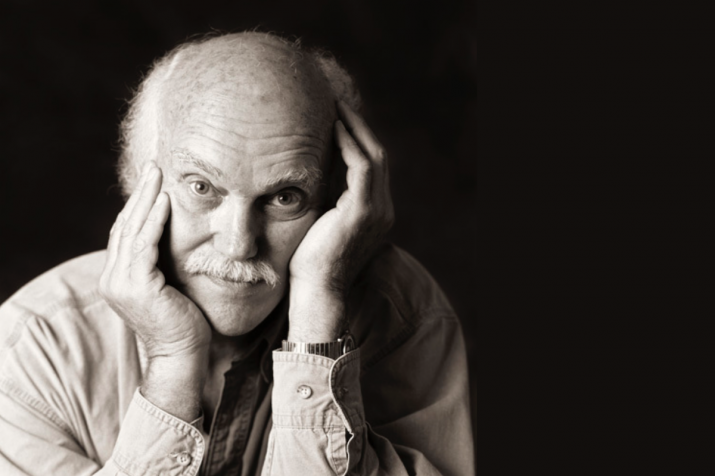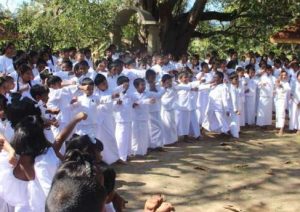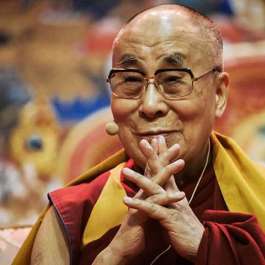
American spiritual teacher, Harvard professor, clinical psychologist, and author Ram Dass (born Richard Alpert) died at his home in Maui, Hawaii, on Sunday. He was 88 years old. His passing has drawn widespread tributes to his memory across social media, along with loving praise for his compassion and spiritual leadership from friends, associates, and students around the world.
Ram Dass received his spiritual appellation, which means “Servant of God” in Hindi, from the Hindu guru and mystic Neem Karoli Baba, whom Ram Dass met during a trip to India in 1967. The meeting would change the direction of Ram Dass’s life, including leading him to author the spiritual guide Be Here Now (1971), which has sold more than two million copies around the world. During the 1960s and 1970s, Ram Dass was one of the key figures of the counterculture revolution that transformed the face of Western society thanks to his research into psilocybin, LSD, and other psychedelic substances along with Harvard colleague Timothy Leary, and for being instrumental in engaging Western interest in the spiritual traditions of Asia.
“With tender hearts we share that Ram Dass . . . died peacefully at home in Maui on December 22, 2019 surrounded by loved ones,” stated a message on his official Instagram account. “He was a guide for thousands seeking to discover or reclaim their spiritual identity beyond or within institutional religion.”
Richard Alpert was born in 1931 to a Jewish family in Newton, Massachusetts, although during his early life he considered himself an atheist. Alpert studied psychology in college, receiving a BA from Tufts University, an MA from Wesleyan University, and a doctorate from Stanford University. After receiving his PhD, Alpert taught at Stanford as a psychology professor and researcher during the 1960s and began a psychoanalysis practice.
It was during his period that Alpert met his close friend and associate Timothy Leary, a lecturer in clinical psychology. In 1961, Alpert and Leary devoted themselves intensive research into the therapeutic potential of hallucinogens, and in 1962 he assisted Harvard Divinity School graduate student Walter Pahnke in the “Good Friday Experiment” with Harvard theology students—considered the first controlled, double-blind study of psychedelics and the mystical experience. In 1962, Alpert and Leary co-founded the non-profit International Federation for Internal Freedom (IFIF) to conduct research into in the religious use of psychedelics. The following year, Leary and Alpert were formally dismissed from Harvard, in Alpert’s case for allegedly administering psilocybin to an undergraduate student as part of a study.
In 1967, as the counterculture hippy movement entered into full flourish, Alpert traveled to eastern India where he met Neem Karoli Baba, who became his guru at Kainchi ashram and gave Alpert his spiritual name Ram Dass. Ram Dass would later describe how through Neem Karoli Baba he experienced a spiritual love deeper than anything he had previously known.
“I remember my first visit with my guru,” Ram Dass recalled. “He had shown that he read my mind. So I looked at the grass and I thought, ‘My god, he’s going to know all the things I don’t want people to know.’ I was really embarrassed. Then I looked up and he was looking directly at me with unconditional love.” (Ram Dass)
Ram Dass returned to the United States with instructions from Neem Karoli Baba to “love everyone and tell the truth.” (Reuters) Psychedelics no longer formed a major part of his life from this point on. Ram Dass’s laid out an account of his spiritual path, along with suggested spiritual techniques and quotes, in the bestselling Be Here Now.
As a counterculture figurehead, Ram Dass would go on to widely share his interpretation of Eastern philosophies in books, articles, lectures, workshops, retreats, and latterly, podcasts, urging his students to root and motivate their every action in love and to sublimate the ego for the sake of the soul.
In 1974, Ram Dass founded the Hanuman Foundation, a nonprofit organization focused on the spiritual well-being of society through education, media, and community service that initiated, among other programs, the Prison-Ashram Project (now the Human Kindness Foundation). In 1978, he co-founded the Seva Foundation joining with healthcare workers to provide treatment for the blind in India, Nepal, and other developing countries. From the inception of the Hanuman Foundation, Ram Dass donated all of his book royalties and teaching profits to his foundation and other charities.
In 1997, Ram Dass suffered a debilitating near-fatal stroke that reduced him physically yet, he said, left him feeling more compassionate and humble. His later years were focused on teachings on aging and dying without fear. Ram Dass continued to make give talks and hold retreats in Maui, and teach through live webcasts and podcasts. Asked to sum up his life’s message, Ram Dass replied: “I help people as a way to work on myself, and I work on myself to help people . . . to me, that’s what the emerging game is all about.” (Yeye 2010)
References
Yeye. 2010. “Baba Ram Dass in the realm of Visionary Artist Martina Hoffmann: in the end there’s only one spirit and one humanness,” in Elephant Journal. Accessed 23 December 2019. (https://www.elephantjournal.com/2010/09/baba-ram-dass-in-the-realm-of-visionary-artist-martina-hoffmann-in-the-end-theres-only-one-spirit-and-one-humanness/)
See more
Ram Dass: Love Serve Remember Foundation
Richard Alpert / Ram Dass Biography (Ram Dass)
Ram Dass, psychedelic drug pioneer, dies at home aged 88 (Reuters)
Spiritual leader Ram Dass dies at 88. Who was he? (India Today)














